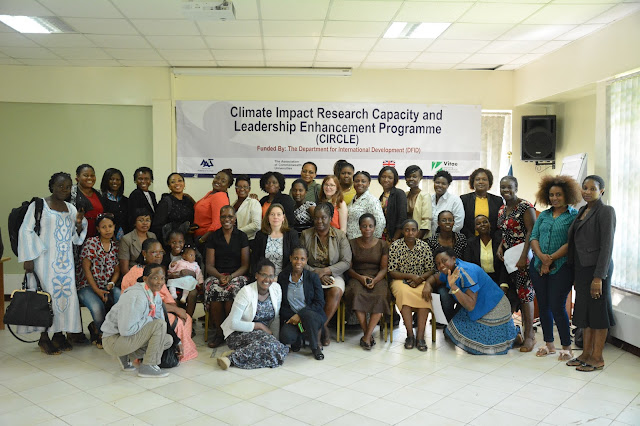 |
| Participants at the CIRCLE proposal writing workshop for female applicants to cohort 3 |
Women are disproportionately
affected by climate change. They have a higher dependence on natural
resources which are increasingly in short supply; natural disasters, which are
becoming more commonplace, kill more women than men; and women often lack the
social capital in society to adapt to changing circumstances or to make their
voices heard. Involving women and other marginalised groups in tackling climate
change and in shaping approaches to cope with and adapt to its impacts can
greatly enhance their effectiveness.
During the Paris climate talks in December, gender was one
of the key
topics under discussion. However, some have suggested
that the debate did not move far enough beyond the impacts of climate change on
women to consider how women themselves can be active agents within the climate
change debate. There is some discussion about women in agriculture and how they
should be engaged in developing solutions on the ground, but what about women’s
engagement within higher level policy discussions?
Though Africa will be one of the continents hardest hit by
climate change, there
are still not enough researchers within the continent examining the impact of
climate change and exploring approaches to mitigate and adapt to its effects.
Women in sub-Saharan Africa are especially underrepresented, making
up just 30% of researchers.
Recognising the lack of African researchers in the field of
Climate change, the Climate Impact
Research Capacity and Leadership Enhancement in Sub-Saharan Africa (CIRCLE)
was developed to support 100 one year fellowships over the course of three
years for early career researchers to conduct a research project at leading
African institutions in the field of climate change. The programme is now going
into its second year with the start of the second cohort of CIRCLE visiting
fellows.
CIRCLE also aims to award 50% of its fellowships to female
researchers, in an effort to address the underrepresentation of women in this
field. To date, 48% of CIRCLE fellows have been female researchers. Over the
course of last year a number of female researchers from the first cohort of
fellows have contributed their experiences to the CIRCLE blog and it is evident
that a lot has been achieved by both male and female fellows.
At the final workshop for the first cohort of CIRCLE
Visiting Fellows (CVFs), a presentation was made by Mercy Derkyi on her plans to
establish a Centre for Climate Change and Gender Studies at the University
of Energy and Natural Resources, Ghana, inspired by the work undertaken during
her fellowship. This exemplified one of the key aims of the CIRCLE fellowships,
to foster the leadership skills of CVFs so that they can have a wider reaching
positive impact. It is hoped that the female CVFs will act as role models to
encourage, inspire and assist more women to undertake climate change research.
The CIRCLE programme is also an important opportunity for
female researchers to strengthen their profile and contribute to the academic
dialogue on climate change. Another CVF, Catherine Mungai, recently won an
award for her research paper, emerging from her CIRCLE research, presented
at the Symposium on Climate Change Adaptation in Africa 2016, CGIAR.
There have been some challenges, however, in ensuring equal
representation of male and female fellows as part of the fellowship. During the
application process some institutions struggled to find female candidates for
the fellowships. Furthermore, the applications that were received were often not
as developed in their scientific design and climate change relevance as those
of their male counterparts.
To confront some of the challenges around attracting
sufficient numbers of high quality applications from women the CIRCLE
management team put in place a number of measures:
- Greater flexibility was allowed for fellows whose family circumstances would affect their ability to travel to other countries to take up their fellowship;
- The specification of a maximum 5 year gap between PhD completion and fellowship was extended for those who had a career break for family reasons
- Home institutions were made aware of the 50% target and any institutions nominating more that one candidate had to nominate at least one woman.
- In February 2016 a workshop was run for potential female applicants for the third and final cohort of CIRCLE fellows to help strengthen their proposal writing skills, with particular reference to their CIRCLE proposal submissions.
With reference to the last initiative, each home institution
was invited to nominate up to two female researchers to attend the workshop,
run by Dr Maggie Opondo and Dr Sari Kovats, both leading female researchers in
the field of climate change. Not only did the workshop cover proposal writing skills,
but also a more in-depth look at gender in climate change and the workshop
leaders spent some time with participants reviewing their draft proposals for
the programme. One workshop participant commented:
“The workshop has helped to broaden my understanding on
proposal writing especially with respect to climate change. I was able to
review my CIRCLE proposal and I feel more confident now that I can approach
proposal writing with ease. I also acquired new and relevant skills which will
be beneficial for my academic discipline.”
Another workshop participant observed:
“The important aspects explained on how to make your
proposal feasible as well as using the gender lens in climate change studies
were wonderful. I have benefited not only as a CIRCLE programme fellow but as a
researcher.”
The drive to increase female representation for the
application process seems to have been effective, with 60% female nominations
for this cohort compared to 39% for both cohorts 1 and 2. Participants at the
workshop in February also indicated that their confidence in writing their
proposal has been increased and the workshop leaders identified a number of
exciting proposal topics, which we are looking forward to receiving for the
final round of CIRCLE applications.
Caroline Moss is a programme Officer at the Association of Commonwealth Universities